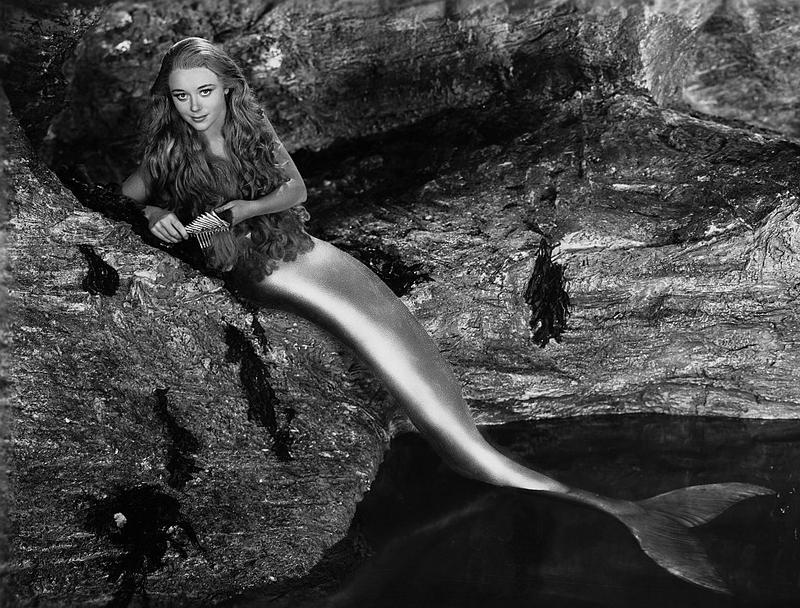The Origins Of Mermaids: Greek Mythology, Ghosts, And Christopher Columbus
By | January 9, 2020

Mermaids have been dazzling seasick sailors and little girls alike since seemingly the beginning of time, but when you think about it, it's pretty odd to be so enamored with the idea of a woman who's half-fish. Where did mermaids come from? Why do we continue to find them so alluring?

The First Mermaid May Have Been A Merman
Some of the oldest surviving references to human-fish hybrids seem to indicate that the first mermaid was actually a merman. The ancient Babylonian sea god, Ea, was depicted with a human torso, arms, and head but the tail of a fish. Much later, the Romans and Greeks adopted many of Ea's traits and applied them to their sea gods, Poseidon and Neptune. The earliest known mermaid legend involves the Assyrian fertility goddess Atargatis, who threw herself into a lake after accidentally killing her mortal lover and took the form of a fish, but only from the waist down, as "the waters [could] not conceal her divine beauty."

Pliny The Elder Legitimized Mermaids
Influential Roman scientist and naturalist Pliny the Elder basically invented the field of natural history with his attempt to catalog every animal in the world, the appropriately titled Natural History, but he played fast and loose with the facts. He wrote about mermaids with such authority that, for hundreds of years, people believed that mermaids were as real as horses and sheep. He even insisted that he knew a guy who knew a guy who totally saw a mess of dead mermaids washed up on the shore one time. Pliny also mentioned a characteristic of mermaids that impacted their reputation well into modern times: that they were malicious and sought to drown humans by capsizing their ships.

The Evil Mermaid
European sailors often brought back stories of encounters with mermaids, claiming they saw beautiful young women with long, flowing hair perched on rocks and singing alluring songs to passing ships. If the sailors fell victim to these enchantments and tried to get closer, it was said, their ship would strike a reef or run aground. Other stories claimed that mermaids and mermen tried to climb aboard ships in the middle of the ocean, causing the ship to list to one side. Even Homer, in his Odyssey, included Sirens, a form of mermaids, who used their stunning beauty and melodic voices to lure sailors to their doom. Meanwhile, in eastern Europe, mermaids were said to be the ghosts of young women who died tragic deaths and lurked in and around bodies of water, entrancing hapless young men who would then be drowned by the spirits.

Mermaid Sightings Were Recorded On Ancient Maps
Since mermaids were such jerks, sea captains avoided areas where mermaids were known to live and worked with cartographers to create maps that noted mermaids' lairs as a warning to other sailors. One of these cartographers was Olaus Magnus, who created the Carta Marina, a comprehensive map of all the sea monsters and mermaids living in the waters around Scandinavia, in the 16th century.

Plenty Of Historical Figures Believed In Mermaids
In reality, most mermaid sightings can be explained by the presence of manatees or other known sea mammals and too many months spent at sea, but we didn't know that during the time of Columbus. In a ship log dated from his trip to what is now the Dominican Republic in 1493, ol' Chris noted three mermaids that he saw frolicking in the water, though they were "not half as beautiful as they are painted." There's just no pleasing that guy.
Christopher Columbus wasn't the only historical sailor who claimed to have a close encounter with a mermaid. John Smith, the Englishman who helped settle Jamestown before he was saved by Pocahontas, had his own mermaid sighting off the coast of Newfoundland in 1614. He was more generous than Columbus: In his journal, he wrote that "her long green hair imparted to her an original character that was by no means unattractive."

A Biblical Mermaid?
Mermaids are not mentioned in the Bible, but the 15th-century Nuremberg Bible contains a woodcut image depicting mermaids swimming around Noah's Ark that threw biblical scholars of the day into debate. Some scholars argued that because mermaids were not onboard the Ark, they must not have been worthy of being saved from the Great Flood. Others pointed out that, as water creatures, they would be at home in the flood waters.

A Mermaid As A Sideshow Attraction
The public interest in mermaids was rekindled in the 1840s, when P.T. Barnum's American Museum in New York displayed the so-called "Fiji mermaid," a small mummified corpse that the circus folks claimed was a real mermaid. In reality, the Fiji mermaid was hoax, just the head and torso of a monkey sewn onto the tail of a fish. Still, it made Barnum a lot of money, and that was kind of his deal. There's a reason it wasn't called P.T. Barnum's Museum of Science and Truth.

The Hollywood Mermaid
There is no shortage of mermaids in entertainment, from fantasy romps like Splash and The Little Mermaid to mockumentaries like 2012's Mermaid: The Body Found. Although inarguably a work of science-fiction, its actors did such a good job as scientists claiming to have discovered evidence of mermaids that many viewer's believed it was the real deal. It wasn't the first time in recent memory that the public proved all too willing to believe in mermaids: A satirical scientific article about mermaids written by oceanographer Karl Banse in 1990 was also initially taken at face value. Sadly, Daryl Hannah is likely as close as we're going to get to real mermaids.

